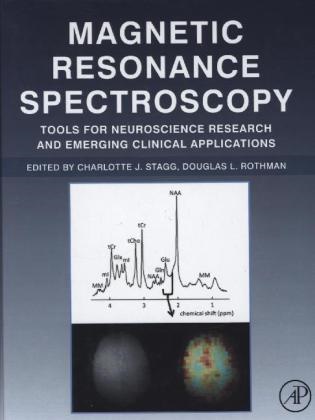Read more
Informationen zum Autor Charlotte Stagg is a British neurophysiologist who is a professor at the University of Oxford. She leads the Physiological Neuroimaging Group. Stagg studied physiology and medicine at the University of Bristol, graduating with pre-clinical and clinical honours and the Physiological Society prize. For her doctoral degree, she moved to the University of Oxford and worked at the Oxford Centre for Functional Magnetic Resonance Imaging (MRI) of the Brain (FMRIB) under the supervision of Paul Matthews and Heidi Johansen-Berg. During her DPhil, she looked to understand how people acquire new motor skills. She joined the Neuroplasticity group for her first postdoctoral position. In 2010 she moved to the Sobell Department of Motor Neuroscience and Movement Disorders, where she worked with John Rothwell for half a year, before joining Andrew Maudsley at the University of Miami. There she became interested in in vivo magnetic resonance spectroscopy. Dr. Rothman is director of the Magnetic Resonance Research Center (MRRC) at the Yale School of Medicine. The MRRC presently supports the NIH- funded work of more than 70 Principal Investigators, as well as 13 program project grants and center grants. Dr. Rothman has an international reputation as a leader in the development of novel MR methods for the study of brain, liver, and muscle metabolism and function. Among the many MR 'firsts' of his team of bioimaging scientists have been the development of MR methods for imaging glutamate and GABA neurotransmission, brain energy metabolism, and liver and muscle glycogen and glucose metabolism and metabolic control. He is presently supported by two R01 grants, and has served as the primary mentor of six postdoctoral fellows and two students. His postdoctoral fellows have all gone on to faculty positions at major research institutions in the US and abroad. He is a named mentor on five K awards at different levels and is an informal mentor to many other junior and mid-level faculty members in the use of MR technology in their research. Klappentext Much of the work of user-centered design practitioners involves some type of interviewing. While interviewing is an important skill, many colleagues have little or no formal training in interviewing methods and often learn on the job with limited feedback on the quality of their interviews. This book teaches readers about the three basic interview methods: structured interviews, semi-structured interviews, and unstructured interviews. The author discusses the various strengths, weaknesses, issues with each type of interview, and includes best practices and procedures for conducing effective and efficient interviews. The book dives into the detailed information about interviews that haven't been discussed before - readers learn how and when to ask the "how" and "why" questions to get a deeper understanding of problems, concepts, and processes, as well as discussions on laddering and critical incident techniques. Because so much of what UX practitioners do involves good interviewing skills, this is your one-stop resource with the definitions, processes, procedures and best practices on the basic approaches. Zusammenfassung Suitable for people new to the technique and give those more familiar with magnetic resonance spectroscopy (MRS) a new perspective! this book addresses the technique of magnetic resonance spectroscopy. It covers both proton and non-proton MRS. Inhaltsverzeichnis Section 1: Technical Aspects - How MRS Is Acquired 1.1 Basis of Magnetic Resonance 1.2 Localized Single-Voxel Magnetic Resonance Spectroscopy, Water Suppression, and Novel Approaches for Ultrashort Echo-Time Measurements 1.3 Technical considerations for Multivoxel Approaches and Magnetic Resonance Spectroscopic Imaging 1.4 Spectral Editing and 2D NMR 1.5 Spectral Quantification and Pitfalls in Interpreting Magnetic Reson...

